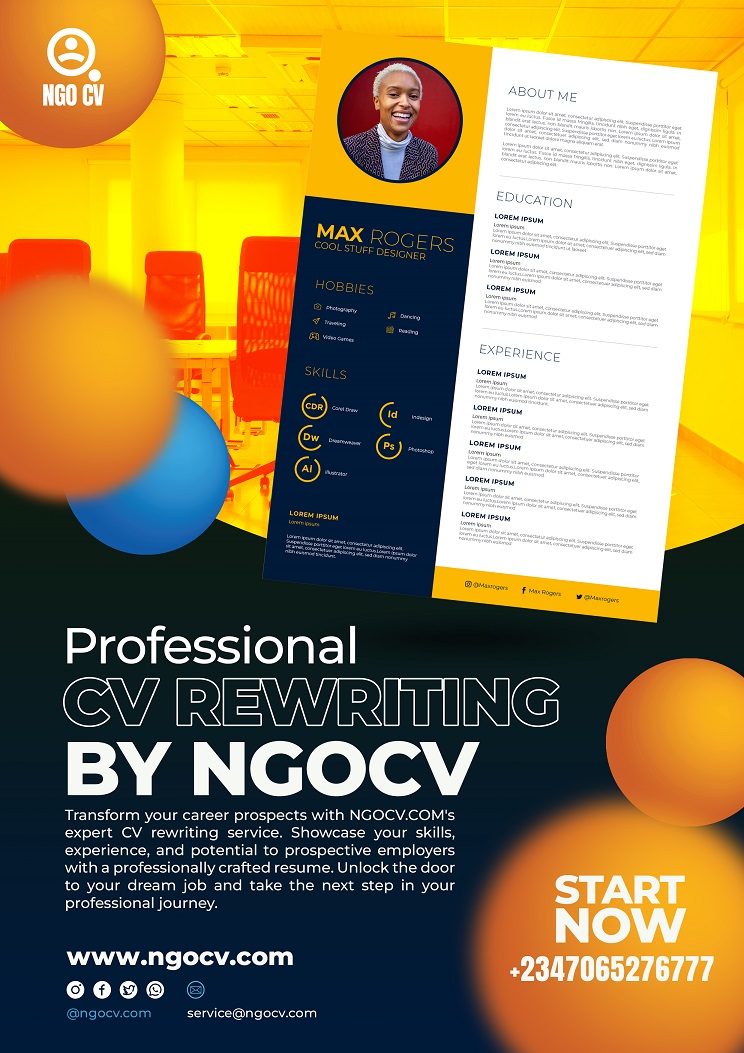COOPI and Christian Aid are jointly implementing a DRR focused action in Northwest Nigeria with funding support from the European Commission for Humanitarian Aid (ECHO), to enhance Disaster Preparedness, timeliness and quality of Risk Information and Response Actions for multiple natural hazards including flooding at Wards, Local, States, and Federal levels in a coordinated manner. This intervention is expected to strengthen the Social Protection Systems such as Social Safety Nets to anticipate and absorb climate-related risks, shocks, and link to Early Warning Systems, appropriate Budget Forecasting, and effective Contingency Mechanisms which will help to protect vulnerable people from the impacts of climate related disasters.
We are recruiting to fill the position below:
Job Title: Consultant for Baseline Study and Stock Taking Exercise of DRR Systems
Location: Kaduna and Sokoto
Slots: 2 Openings
Employment Type: Part-time
Draft Report: by August 21st.
Final Report: by August 28th, 2021.
About the Project
- The project focuses on 16 rural / urban communities in 4 Local Government Areas of Kaduna and Sokoto States, based on Needs Assessment conducted as well as Learning from an earlier ECHO funded DRR project.
- The intervention aims to improve and decentralize Early Warning Systems for natural disasters (with a focus on flooding) leading to Early Responses at all levels with appropriate components of Social Protection.
- The purpose of this consultancy is to carry out a baseline study and context analysis of the two States in relation to natural disasters, risk management, operations, preparedness, response and coordination by state and non-state actors from the communities to Local Government, State and Federal levels to form a basis for performance management. It shall also examine the effectiveness and performances of the States’ social protection policy in relation to programming, implementations, and impacts. This will also inform the challenges in the policy operations and appropriate recommendations to overcome them.
Objective of the Project
- The objective of the study is to conduct a stocktaking of performances of the Social protection initiatives, and natural disasters (primarily flooding) management mechanisms and capacities of various actors including State Agencies, Humanitarian Actors, as well as non-state actors from selected communities in Kaduna and Sokoto States
- Providing clear recommendations on improving social protection programmes and decentralized early warning and early response systems in the target states.
Specific Objectives of the Study:
- Carry out analysis of past and current disasters and its immediate and long-term effects on the community members and community structures (Focusing on historical timeline, frequency, seasonality, intensity and duration, impact on lives and livelihoods of the people, including existing response structures and capacities)
- Carry out a comprehensive mapping of institutional frameworks and policies in place for natural disaster management.
- Mapping of existing Early Warning Systems, its functionality and effectiveness in target States and an analysis of how the EWS is linked to national level EWS structures.
- Identify and review in each State, existing disaster management structures viz-a-viz coordination, capacity, response, strength, weaknesses, and opportunities available and links with national structures and mechanisms.
- Review the effectiveness of social protection programmes and the extent of Gender and Inclusion in the existing DRR systems in the States.
- Facilitate with clear recommendations towards the adaptation of National Social Protection policy and making it state-specific for Kaduna and Sokoto state. Social protection policies support the development of well-targeted, appropriately financed and well-coordinated responses to disasters, poverty and vulnerability, thus contributing to poverty reduction efforts
- Clearly identify and recommend modalities to ensure that Sokoto and Kaduna States are more resilient to recurrent shocks and build resilience, through effective support for skills development and enhanced state capacity to provide technical assistance.
- The consultancy will support the development of a Gender and Inclusion responsive DRR strategy and action plan which encompasses the priorities endorsed in the main national strategy and policy documents and guide responsive gender and social inclusion in local development planning frameworks towards supporting the project implementation and ensuring women and vulnerable persons empowerment through appropriate strategies and actions.
- Provide clear recommendations on strengthening community-based Early Warning Systems specific to flooding – EWS design – operational structure, resources requirement and capacity building needs at different levels.
- Establish base line figures for indicators in the project log frame
- The baseline will primarily focus on supporting the fine tuning of the design of the ‘Early Warning- Early response’, project being implemented by the project team (comprising of COOPI and CA). It will also analyses opportunities beyond the current Project, with the aim to inform Kaduna and Sokoto States’ governments, a holistic Disaster Management Mechanism.
The study will gather information and formulate specific recommendations on:
- Enhancing coordination among state and non-state actors
- Improving the planning and implementation of Social Protection structures/systems and programmes
- Improving governments’ responses to disaster events within the existing policy framework
- Addressing the capacity gaps of disaster management agencies and structures
- Institutionalizing Early Warning System within the States, and Local governments, and Communities
- Establishment and strengthening of supervision of state and community-based structures.
Key Responsibilities (Tasks)
- Develop the methodology and tools required for undertaking this study, finalized based on the feedback from project team and pre-testing of tools.
- Recruitment and training of Research Assistants (Enumerators) on data collection
- Lead the data collection, supervise the data collection processes, and ensure quality of data collected
- Complete the Analysis of field data and produce a final Baseline report, incorporating feedback from the project team
- Validation of the report in consultation with relevant stakeholders, through a consultative meeting, supported by the project team
Methodology
The study shall use a mix of qualitative and quantitative research methods
Sources of Data
Primary data sources:
- Focus Group Discussions: FGDs will be used at the community level to collect information on the risks and vulnerabilities, impact of disasters, community level early warning systems available and its effectiveness, preparedness, and response capacity at the community level including impact of government initiatives around Social Protection on the people. 2 FGD each will be carried out in 6 sample communities in two states out of the total 8 communities. In each community, one FGD will be carried out with women and men groups. FGD participants shall consists of various vulnerable sections of the communities including people with disability, and elderly. Children should be given opportunity in participating in the discussions.
- EWS Audit: Carry out Early Warning Systems’ audit in at least 3 sample communities, using the EWS Audit tools provided by the project team.
- Key informant interviews: Consultant will identify key informants to be interviewed to collect more specific and in-depth data. This will include representatives from key stakeholders such as NEMA, SEMA, Ministry of Environment, NIMET, NHSA, NOA, and responsible agencies or ministries of government saddled with the mandate of formulating and implementing programmes around social protection The Red Cross Society and other Humanitarian Actors including UN agencies, community leaders etc. will also be engaged. No of KII and list of people to be interviewed should be agreed with CA during the methodology finalization stage.
- HH level survey using Questionnaire: A questionnaire shall be developed, pre-tested and finalized by the consultant in consultation with the project team before administering at the community level. Questionnaire will be used to gather information from communities on disaster experience, knowledge, and practice on EWS, disaster preparedness and response, functionality of the EWS available and suggestions on an effective early warning and response mechanism including impact of government support programmes (if any) on the people. Sample size will be decided based on the total size of the population.
- Vulnerability and Capacity Assessment: Carry out vulnerability and capacity assessment using participatory methodology in at least one community in each of the two States and one State level VCA in each State.
- GESI Audits: Questions will be developed to review partners’ and stakeholders’ knowledge of Gender Equality and Social Inclusion (GESI) responsive programming, including the key vulnerable groups in their locations. The extent to which this knowledge translates to improved protection systems, structures (and policies) for vulnerable groups and inclusive disaster risk management.
Secondary Data Sources:
- Desk review:Review of available literature related to the objectives of the study will be carried out leading to the formulation of tools and selection of participants for primary data collection exercise. Information collected through secondary sources need to be triangulated through primary data sources, as much as possible.
Data Collection Process:
- Data collection process will be led by the consultant. While the qualitative data gathering will be carried out primarily by the lead consultant. Enumerators will be recruited for quantitative data gathering. Each state will have 3 to 5 enumerators, based on the sample size, who will then be trained on data collection tools and methodologies. Training will include supervised data collection in one community which can be used as an opportunity for pre-testing of tools. Data collection shall happen parallel in the two States. The project MEAL team will support the training of enumerators and data collection process at the community level.
Data Analysis:
- The lead Consultant will be responsible for data entry and analysis using appropriate software. Data collection using Kobo tool is recommended if the consultant has the technical capacity and resources.
Expected Output:
An inception report detailing:
- Scope of the study
- Initial findings from the preliminary secondary data review
- The study methodology that includes data collection tools, data collection plan and plans of data analysis
- Study objective and detailed plan on how each of the study objective is going to be achieved
- Activity schedule for the entire study
- A draft report with detailed analysis and findings on each of the study objectives
- Make a presentation of the report to the project team and selected stakeholders for review and feedback
- Finalize the report incorporating feedbacks
- Facilitate the report validation meeting organized by the project team
Final Report:
- The final report shall be submitted within 6 weeks paid consultancy periods (excluding weekends) after the signing of the agreement.
- The report should not exceed 30 pages, excluding annexes
- The report shall include:
- List of Acronyms,
- Executive summary, not more than 3 pages with key findings and recommendations
- Study methodology
- Objective wise detailed analysis and findings
- Recommendations on establishing/strengthening early warning systems and response capacity – including specific capacity building needs at different levels and improving States’ Social Protection programming.
- Conclusion
- Annexes – including data collection tools, graphs, table and other figures derived from surveys, FGD and other data collection tools, List of people participated in the study, details of stakeholders consulted, references and photos of various activities undertaken in in the study.
- Raw data for quantitative and qualitative data need to be submitted to the project team separately
- Soft copy of the final report and study related data and material should be submitted to the project team in a flash disc or any other digital means possible
Quality Assurance:
- The consultant is responsible for data quality and validity, consistency, and accuracy and to submit a well-structured report written in English. If these standards are not met, the consultant will, at his/her own expense, make the necessary amendments to bring the reports to the required standards.
- Consultant is expected to maintain confidentiality of the data collected through the study
- The project team will be the sole owner of the data and the study outputs and consultant should get written permission from the project team for using the study result or data for any other purposes.
Ethical Considerations:
- Research participants should not be subjected to harm in ways whatsoever
- Respect for the dignity of research participants should be prioritized
- Full consent should be obtained from the participants prior to the study
- The protection of privacy of the study participant must be ensured
- Adequate level of confidentiality of data should be ensured
Lines of Reporting:
- Consultant will work closely with the project and report to the project team through the Senior Programme Coordinator, MEAL. The lead Consultant MUST get approval for the work plan, research methodology and tools from the MEAL Coordinator before initiating the field research. For the State level activities consultant shall coordinate with the Project Technical Lead. Consultant shall organize weekly progress review meeting over Skype or in person with the Project MEAL and Programme representative to update the progress of the work, for feedback, and to discuss and address any challenges arising.
Timeline for Deliverables:
- Debrief with the project team: on the week of July 30th July, 2021. This exercise should involve a discussion between the consultant and the project team on the methodology and work-plan, sampling criteria, proposed key informant samples, data collection tools and logistical arrangements
- Draft report: by August 21st.
- Final report: by August 28th, 2021.
Consultant Competencies and Required Skills
The consultant(s) must be available in the States to carry out the assessment. COOPI and Christian Aid are seeking individual with:
- A University Degree ( minimum Master’s Degree level) in Gender Study / Development Studies / International Relations / Social Science / Political Science or in any relevant area is required.
- Minimum of 24 to 31 years experience.
- Previous experience and knowledge relating to climate change adaptation, disaster risk reduction and how this impact on gender and social aspects
- Have an experience of organizing/leading discussions, facilitating a variety of events, workshops, working with government, local authorities, community groups as well as providing analysis and reporting.
- Demonstrable experience of producing high-quality, credible research/assessments (sample report of such is required).
- Excellent spoken and written English (knowledge about the target state language is an advantage)
- Understanding and experience of working with state and non-state actors (at all levels) and international organizations
- Ability to show evidence of prior activity i.e. research or trainings over a period on disaster management analysis (Expertise in advocacy and policy analysis around social inclusion is a priority).
- Knowledge of research and monitoring and evaluation methodologies, including quantitative and qualitative
- Knowledge of governance and conflict programming (desirable)
- Excellent computer skills.
Budget and Terms of Engagement
- The project through COOPI and Christian Aid will cover for the necessary costs incurred by the consultant according to agree in-country rates where necessary. All other costs incurred will be covered from the consultancy fee. (60%) initial payment will be made (when the contract is signed) at the commencement of the job while balance payment will be paid upon receipt of a satisfactory final report. 5% withholding tax will be deducted at source for individual consultancy and 10% for an organizational consultancy from the total cost of the consultancy fee.
Application Closing Date
28th July, 2021.
Method of Application
Interested and qualified consultants / organizations should submit a proposal to [email protected] copying [email protected] and [email protected] using the position title as the subject of the mail.
Important Notice to Individuals and Organizations
The project Team invites proposals from organizations, or individuals, with the experience and skills described above. Tenders should include the following:
- A cover letter introducing the researcher / organization and how the skills and competencies described above are met, with concrete examples.
- A 2 – page outline of the proposed assessment process and methodology.
- An overview of consultant’s academic qualifications / CVs and relevant experience to be included.
- An example of a previous assessment / research report and 2 references from organizations where assessment / research was conducted.
- Proposed budget and timeline
- Please note that only shortlisted candidates will be contacted and only firms / applicants’ resident in Nigeriaare eligible to apply.




